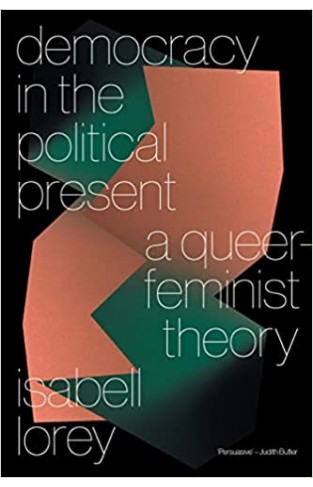- Home
- Business & Management
- Business & Economics
- Democracy in the Political Present - A Queer-Feminist Theory
Democracy in the Political Present - A Queer-Feminist Theory
By: Isabell Lorey
-
Rs 4,670.75
- Rs 5,495.00
- 15%
You save Rs 824.25.
Due to constant currency fluctuation, prices are subject to change with or without notice.
Democracy in the Political Present - A Queer-Feminist Theory
By: Isabell Lorey
Rs 4,670.75 Rs 5,495.00 Ex Tax :Rs 4,670.75
Zubin Mehta: A Musical Journey (An Authorized Biography)
By: VOID - Bakhtiar K. Dadabhoy
Rs 892.50 Rs 1,050.00 Ex Tax :Rs 892.50
The Origins of Political Order From Prehuman Times to the French RevolutioN
By: Francis Fukuyama
Rs 4,045.50 Rs 4,495.00 Ex Tax :Rs 4,045.50
Reset: How This Crisis Can Restore Our Values and Renew America
By: Kurt Andersen
Rs 450.00 Rs 500.00 Ex Tax :Rs 450.00
How To Win A Cosmic War God Globalization And The End Of War
By: Reza Aslan
Rs 625.50 Rs 695.00 Ex Tax :Rs 625.50
Game Change Obama And The Clintons McCain And Palin And The Race Of A Lifetime
By: John Heilemann
Rs 715.50 Rs 795.00 Ex Tax :Rs 715.50
Made to Stick: Why Some Ideas Take Hold and Others Come Unstuck
By: Chip Heath & Dan Heath
Rs 2,695.50 Rs 2,995.00 Ex Tax :Rs 2,695.50
No similar books from this author available at the moment.
Stop the Next War Now - Effective Responses to Violence and Terrorism
By: Medea Benjamin
Rs 8,091.00 Rs 8,990.00 Ex Tax :Rs 8,091.00
Thunderbirds Are Go Magnetic Bookmarks-Kayo Kyrano
By: That Company Called IF UK
Rs 445.50 Rs 495.00 Ex Tax :Rs 445.50
Science of Yoga - Understand the Anatomy and Physiology to Perfect Your Practice
By: Ann Swanson
Rs 4,695.00 Ex Tax :Rs 4,695.00
Hide and Seek - A Bletchley Park Mystery
By: Rhian Tracey
Rs 1,705.50 Rs 1,895.00 Ex Tax :Rs 1,705.50
The Very Hungry Caterpillar'S Bugs Colouring Book
By: Puffin Children Books
Rs 845.75 Rs 995.00 Ex Tax :Rs 845.75
Zubin Mehta: A Musical Journey (An Authorized Biography)
By: VOID - Bakhtiar K. Dadabhoy
Rs 892.50 Rs 1,050.00 Ex Tax :Rs 892.50
Democracy in the Political Present - A Queer-Feminist Theory
By: Isabell Lorey
Rs 4,670.75 Rs 5,495.00 Ex Tax :Rs 4,670.75














-120x187.jpg?q6)





-120x187.jpg?q6)
















